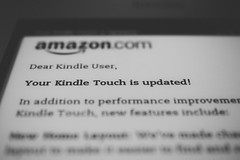 Over at The Federalist, Adam Gurri writes about how Amazon.com's recent spat with Hachette doesn't signal the end of days for traditional publishing. Excerpt:
Over at The Federalist, Adam Gurri writes about how Amazon.com's recent spat with Hachette doesn't signal the end of days for traditional publishing. Excerpt:The extended dispute between Amazon and publisher Hachette finally came to an end earlier this month. Amazon had wanted Hachette to price its e-books lower while giving Amazon a bigger cut; and when Hachette didn’t comply, Amazon slowed delivery of Hachette books and removed the pre-order option for them.Read the whole thing -- right now, if your schedule allows. No, seriously, anyone with a passing interest in fiction publishing ought to spend five-or-so minutes with Gurri's piece. In the social-media world, I've seen more than a fair share of authors using expansive terms to bemoan the Hachette spat. But by using the example of pop-horror author Scott Sigler (an indie who rode the nü-publishing wave to mainstream success), Gurri reminds us that intersection of technology, economics, and entrepreneurship offers more options for creative types, not fewer. Careers are determined by discipline and creative risk taking, not faceless hegemonies hunched around teak conference tables.
During the contract disputes, we learned that publishers have become relatively sympathetic in the public eye now that a behemoth like Amazon is bigger than they are. Yet it seems not so long ago that many exulted that the web would allow authors to circumvent publishers and go to readers directly. In this scenario, publishers were often painted as monopolistic gatekeepers. This image is still embraced by writers such as Matthew Yglesias, but during the dispute most observers voiced a concern that Amazon has simply become too powerful, and that it would be bad for readers and worse for authors. I think this whole incident was overblown, on all sides; Amazon has made things drastically better for readers and writers, and while publishers will have to adapt to new technological realities, they are still likely to have an important role.
(Picture: CC 2012 by Vincent Lee)


No comments:
Post a Comment